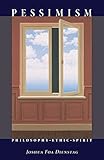Pessimism : Philosophy, Ethic, Spirit / Joshua Foa Dienstag.
Material type: TextPublisher: Princeton, NJ : Princeton University Press, [2009]Copyright date: ©2006Edition: Course BookDescription: 1 online resourceContent type:
TextPublisher: Princeton, NJ : Princeton University Press, [2009]Copyright date: ©2006Edition: Course BookDescription: 1 online resourceContent type: - 9780691141121
- 9781400827480
- 149.6
- B829.D54 2009
- online - DeGruyter
- Issued also in print.
| Item type | Current library | Call number | URL | Status | Notes | Barcode | |
|---|---|---|---|---|---|---|---|
 eBook
eBook
|
Biblioteca "Angelicum" Pont. Univ. S.Tommaso d'Aquino Nuvola online | online - DeGruyter (Browse shelf(Opens below)) | Online access | Not for loan (Accesso limitato) | Accesso per gli utenti autorizzati / Access for authorized users | (dgr)9781400827480 |
Browsing Biblioteca "Angelicum" Pont. Univ. S.Tommaso d'Aquino shelves, Shelving location: Nuvola online Close shelf browser (Hides shelf browser)

|

|

|

|

|

|

|
||
| online - DeGruyter Explaining the Cosmos : The Ionian Tradition of Scientific Philosophy / | online - DeGruyter Beyond Liberal Democracy : Political Thinking for an East Asian Context / | online - DeGruyter Regulating Aversion : Tolerance in the Age of Identity and Empire / | online - DeGruyter Pessimism : Philosophy, Ethic, Spirit / | online - DeGruyter Journeys to the Other Shore : Muslim and Western Travelers in Search of Knowledge / | online - DeGruyter The Politics of Life Itself : Biomedicine, Power, and Subjectivity in the Twenty-First Century / | online - DeGruyter The Citizen and the Alien : Dilemmas of Contemporary Membership / |
Frontmatter -- Contents -- Preface -- Acknowledgments -- Abbreviations -- Part I. -- Chapter One. The Anatomy Of Pessimism -- Part II. -- Chapter Two. "A Philosophy That Is Grievous But True" Cultural Pessimism In Rousseau And Leopardi -- Chapter Three. "The Evils Of The World Honestly Admitted" Metaphysical Pessimism In Schopenhauer And Freud -- Chapter Four. "Consciousness Is A Disease" Existential Pessimism In Camus, Unamuno, And Cioran -- Part III. -- Chapter Five. Nietzsche's Dionysian Pessimism -- Chapter Six. Cervantes As Educator Don Quixote And The Practice Of Pessimism -- Chapter Seven. Aphorisms And Pessimisms -- Chapter Eight. Pessimism And Freedom (The Pessimist Speaks) -- Afterword -- Bibliography -- Index
restricted access online access with authorization star
http://purl.org/coar/access_right/c_16ec
Pessimism claims an impressive following--from Rousseau, Schopenhauer, and Nietzsche, to Freud, Camus, and Foucault. Yet "pessimist" remains a term of abuse--an accusation of a bad attitude--or the diagnosis of an unhappy psychological state. Pessimism is thought of as an exclusively negative stance that inevitably leads to resignation or despair. Even when pessimism looks like utter truth, we are told that it makes the worst of a bad situation. Bad for the individual, worse for the species--who would actually counsel pessimism? Joshua Foa Dienstag does. In Pessimism, he challenges the received wisdom about pessimism, arguing that there is an unrecognized yet coherent and vibrant pessimistic philosophical tradition. More than that, he argues that pessimistic thought may provide a critically needed alternative to the increasingly untenable progressivist ideas that have dominated thinking about politics throughout the modern period. Laying out powerful grounds for pessimism's claim that progress is not an enduring feature of human history, Dienstag argues that political theory must begin from this predicament. He persuasively shows that pessimism has been--and can again be--an energizing and even liberating philosophy, an ethic of radical possibility and not just a criticism of faith. The goal--of both the pessimistic spirit and of this fascinating account of pessimism--is not to depress us, but to edify us about our condition and to fortify us for life in a disordered and disenchanted universe.
Issued also in print.
Mode of access: Internet via World Wide Web.
In English.
Description based on online resource; title from PDF title page (publisher's Web site, viewed 08. Jul 2019)


